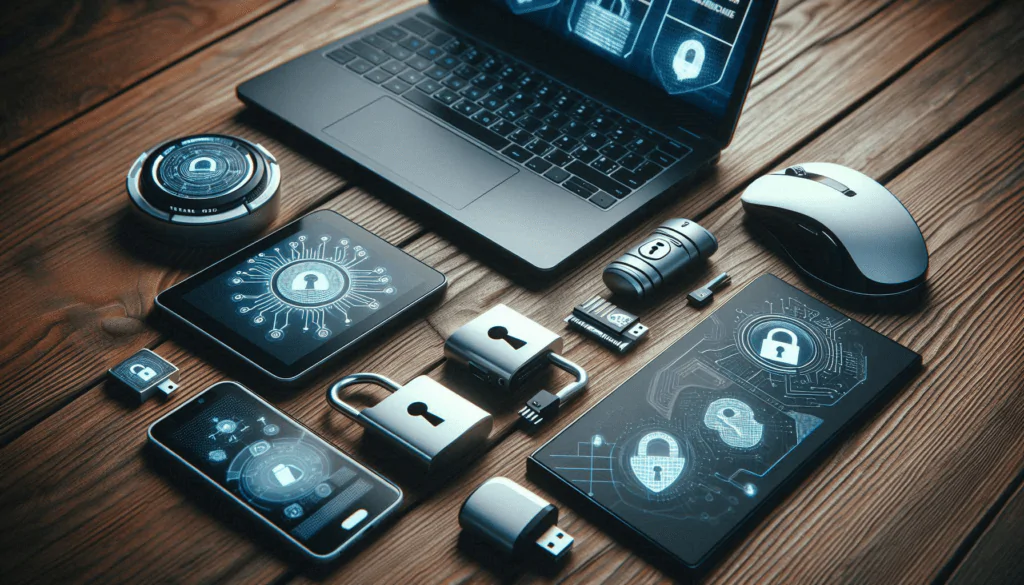In today’s rapidly changing, digitally evolved world, there has never been a more opportune time to require powerful web security. As cyberattacks, data breaches, identity theft, and surveillance threats increase, it is important that individuals and companies go in a forward direction in securing their web presence. While programs like antivirus programs and VPNs are top additions to cybersecurity, several tech devices can become central in how they can aid in augmenting safety when online. These devices not only protect your data but also enhance your digital health and smarts.
Let’s see some of the top tech gadgets that can be used to improve your online security in 2025.
-
Hardware Security Keys (e.g., YubiKey, Google Titan Security Key)
A hardware security key is perhaps the best means of protecting your online accounts using two-factor authentication (2FA). In contrast to codes received via email or text, which are vulnerable to being intercepted, a physical key provides a tangible added layer of security. The YubiKey or Titan Security Key is a device that is inserted into your computer or attached via NFC to your phone, authenticating your presence before granting access to your accounts.
They are useful in securing Google accounts, bank apps, social media websites, and even enterprise networks. For anyone in need of world-class protection, especially against phishing as well as account takeover attacks, a hardware key is an absolute necessity.
-
Encrypted USB Drives (e.g., Apricorn Aegis Secure Key, Kingston IronKey)
For everyone who works with sensitive information—financial records, private documents, or company data—carrying a regular USB flash drive is not safe. Encrypted USB drives provide enhanced protection through the form of hardware encryption. These flash drives tend to prompt a PIN or fingerprint to be entered to unlock, and also delete their contents automatically after making multiple incorrect attempts.
They are perfect for users who transfer data around from device to device or have critical files on the go. Contents are out of reach for unauthorized persons in the event of loss or theft.
-
Privacy Webcam Covers
While conceptually simple, webcam covers are a cheap but highly recommended piece of personal internet security. Webcamsters hack into your webcam remotely via malware, enabling them to turn it on secretly. A diminutive sliding cover simply occludes your camera when not being used, providing comfort and anonymity.
Whether a laptop, tablet, or separate webcam is being used, these small covers are an effective solution for protection from visual espionage.
-
Secure Wi-Fi Routers (such as Firewalla, Gryphon, Eero Secure)
Your home router is the entry point to your entire network. If it gets compromised, all the devices connected to it are at risk. New secure routers feature real-time threat scanning, ad blocking, parental controls, support for VPN, and automatic firmware updates. Devices such as Firewalla and Gryphon exceed a typical router by providing advanced app-based monitoring of your network.
A wise investment in a secure router not only improves your connection uptime but also provides security for your home network.
-
Portable VPN Routers (e.g., GL.iNet Slate AX, InvizBox Go)
For commuters, business users, or freelance workers, public Wi-Fi is a convenience with risk. With a mobile VPN router, you can browse securely with a private network even when you’re on public Wi-Fi in airports, coffeehouses, or hotels. Mobile VPN routers transfer all your traffic over a secure VPN tunnel, shielding your data from possible eavesdroppers on public networks.
They are small, simple to use, and provide safer online work and communications while mobile.
-
Smartphone Privacy Screen Protectors
Privacy screen protectors limit the viewing angle of your tablet or smartphone, and it becomes virtually impossible for strangers to see what’s on your screen in public. They are especially useful to corporate professionals dealing with sensitive information in public places. Though they do not protect against cyber attacks, they are a real buffer against shoulder-surfing as well as visual information leaks.
-
Biometric Security Devices
Biometric authentication devices, such as fingerprint readers and facial recognition locks, place a high level of security on your online presence. These devices ensure that only authorized individuals can access certain information or devices. USB fingerprint readers, for instance, can be employed to unlock a computer or lock files.
Whereas biometric characteristics are built into the majority of contemporary smartphones and laptops, there are also external devices that provide an additional layer of personalization and security.
-
Faraday Bags
Faraday bags filter out all wireless signals, such as Wi-Fi, GPS, Bluetooth, and cellular. They are employed in order to keep devices like smartphones, key fobs, and credit cards away from signal-based attacks or unwanted tracking. Journalists, business travelers, and privacy rights activists particularly adore the bags because they do not want unwanted surveillance.
Final Thoughts
With the ever-changing digital threat environment, it is not enough to depend on software. Merging established cybersecurity software with trusted tech devices offers a potent defense mechanism. You may be a casual net surfer or a security pro; adding some of these devices to your operations can greatly limit your exposure to cybercrime.
Lastly, the most robust internet security strategy is multi-layered, combining awareness, best practices, and intelligent technology tools to provide a secure and personalized digital experience.







